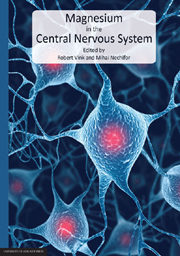Book contents
- Frontmatter
- List of Contributors
- Preface
- Contents
- Section 1 Magnesium in Normal Brain
- Section 2 Magnesium in Neurological Diseases
- Chapter 7 The role of magnesium therapy in learning and memory
- Chapter 8 The role of magnesium in headache and migraine
- Chapter 9 Magnesium in edema and blood-brain barrier disruption
- Chapter 10 Magnesium and hearing loss
- Chapter 11 The role of magnesium in pain
- Chapter 12 The role of magnesium in traumatic CNS injury
- Chapter 13 The use of magnesium in experimental cerebral ischaemia
- Chapter 14 Magnesium in subarachnoid hemorrhage
- Chapter 15 Magnesium in clinical stroke
- Chapter 16 Magnesium in cancer: more questions than answers
- Chapter 17 Magnesium in Parkinson's disease: an update in clinical and basic aspects
- Section 3 Involvement of Magnesium in Psychiatric Diseases
Chapter 10 - Magnesium and hearing loss
from Section 2 - Magnesium in Neurological Diseases
Published online by Cambridge University Press: 05 June 2012
- Frontmatter
- List of Contributors
- Preface
- Contents
- Section 1 Magnesium in Normal Brain
- Section 2 Magnesium in Neurological Diseases
- Chapter 7 The role of magnesium therapy in learning and memory
- Chapter 8 The role of magnesium in headache and migraine
- Chapter 9 Magnesium in edema and blood-brain barrier disruption
- Chapter 10 Magnesium and hearing loss
- Chapter 11 The role of magnesium in pain
- Chapter 12 The role of magnesium in traumatic CNS injury
- Chapter 13 The use of magnesium in experimental cerebral ischaemia
- Chapter 14 Magnesium in subarachnoid hemorrhage
- Chapter 15 Magnesium in clinical stroke
- Chapter 16 Magnesium in cancer: more questions than answers
- Chapter 17 Magnesium in Parkinson's disease: an update in clinical and basic aspects
- Section 3 Involvement of Magnesium in Psychiatric Diseases
Summary
Abstract
Hearing loss is a major public health problem with a large number of causes. Among them, noise-induced hearing loss, drug ototoxicity and sudden sensorineural hearing loss have been proven to result in part from metabolic disorders. Metabolic disorders have multiple origins such as: ionic, ischemic, excitotoxic and production of cochlear free radicals causing cell death, via necrosis or apoptosis. The efficacy of magnesium, administered either to prevent or to treat hearing damages has been demonstrated in several studies in animals and in humans, particularly in noise-induced hearing loss. The exact mechanism by which Mg2+ acts is not fully known. Different hypotheses exist including calcium antagonism, vasodilatation, antioxidant and anti-NMDA properties. Because it is a relatively safe and well-known treatment, magnesium therapy, alone or in association, could be of a great interest to improve auditory recovery.
Introduction
According to the World Health Organization, 278 million people worldwide have moderate to profound hearing loss in both ears. Besides pathologies of unknown origin such as sudden hearing loss and Meniere's disease, hearing loss has so many known causes, it would be arduous to list them all.
- Type
- Chapter
- Information
- Magnesium in the Central Nervous System , pp. 145 - 156Publisher: The University of Adelaide PressPrint publication year: 2011
- 6
- Cited by

